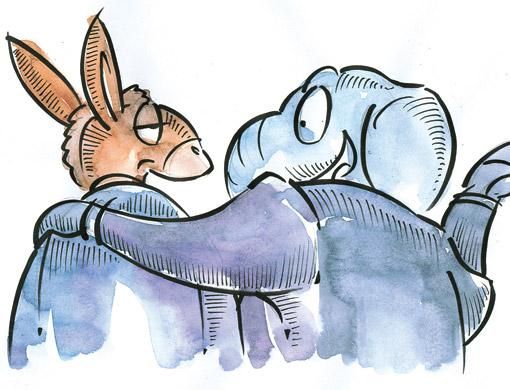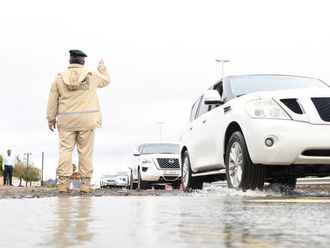This is a good time to be in Washington D.C. if you're looking to make a deal. The neocons are licking their wounds in the wake of the midterm election results.
To their shock and awe, the House will now be headed by a liberal woman Democrat from San Francisco. The new Speaker-designate, Nancy Pelosi, is anathema to die-hard Republican conservatives.
But as is the case after most political tremors, the mood is ready for a fresh round of dealing and wheeling, political jockeying and arm twisting. It's still very civil in Washington; President George W. Bush and Pelosi stood shoulder to shoulder and talked about bipartisan cooperation on the Hill to help the administration find new ways on Iraq and other issues.
But this is the time when the wounded administration is expected to offer free gifts to the rival party that now controls both houses of Congress.
Within 24 hours of their historic win, the gifts started to hail on the Democrats. Donald Rumsfeld, secretary of defence and a major architect of the now botched Iraq war game-plan was the first to go.
Bush did not even wait for the Democrats to claim Rumsfeld's head. The bellicose, arrogant and scheming man heading the Pentagon had become a stigma for the Bush administration.
The Democrats, dazed by their landslide victory, will want more offerings. Bush said he will not sacrifice his top man at the UN, John Bolton, who needs to be reconfirmed in his position by the Senate.
That seems unlikely now since Bolton represents the boorish face of US foreign policy and manifests one of its main pillars under Bush: unilateralism. There is a strong conviction on the Hill that unilateralism has done more damage to America than good.
Moving quickly
Bush will want to engage the Democrats on policies if he is to avoid becoming a lame-duck president for the remainder of his second term. That's why he is moving quickly to address concerns on the Iraq issue. His new secretary of defence, former CIA director Robert Gates, is a member of the bipartisan Iraq Study Group, co-chaired by veteran politician James Baker.
Both men's views on Iraq, Iran and Syria have been made public through various media reports. Such stands negate another pillar of US foreign policy: interventionism as a tool for regime change.
Sure enough the White House announced this week that the Bush administration will look into options on Iraq, including talking to Iran and Syria, two important neighbours of the beleaguered country. That is bad news for the neoconservative eggheads who once considered Damascus and Tehran rogue states and members of the "axis of evil".
Apart from Iraq, the special deals season could affect the Palestinian-Israeli issue. Israel's Prime Minister Ehud Olmert was quick to visit Washington to make an assessment of the new mood in the US capital. He was under pressure to find ways to jump-start the stalled peace process and make Palestinian life a bit easier.
The Israelis will not be happy to hear about the White House's new position on Iran and Syria. Any softening of US policy towards two of Israel's arch-enemies will not be appreciated by Tel Aviv.
The Palestinians have lost most of their political capital in Washington. Palestinian National Authority President Mahmoud Abbas may need to find an excuse to travel to the US capital quickly to shop for an opportunity.
If his own deal with Hamas succeeds and a new national unity government is formed, then he may be able to get some sort of a commitment from Bush. It is Bush, after all, who backed Abbas after Yasser Arafat's death and promised to lean on Israel to fulfil its commitments under the roadmap.
But without Arab support, the Palestinians will not be able to get much out of the Bush administration at this stage. This will be an opportune time for America's Arab allies to visit the US capital and pledge their case for a stable Middle East based on the revival of the peace process. A window of opportunity exists now, but may not stay open for more than two to three months.
This is also a good time for the Europeans to make true on their promises to help move things in the embattled region. Bush needs Europe now more than ever in Iraq, Afghanistan and to get the peace process moving.
The reason why the Bush administration may decide to make a new deal concerning the Middle East is obvious. Its policies in this part of the world, particularly since 9/11, have been dismal and futile if not self-defeating.
Bush could still save his presidency and secure his legacy. The Middle East offers an opportunity to do just that. But he needs Democratic support for any initiative he may decide to propose.
The timing is favourable, but the Arabs need to rally Washington to create the momentum and woo the new Congress. Unfortunately they lack a game plan of their own. They need creative ideas on Iraq, battling extremism and reviving the peace process.
Most of all they need to speak with one voice in order to have half a chance at grabbing a decent deal in Washington.
Osama Al Sharif is a Jordanian journalist based in Amman.











